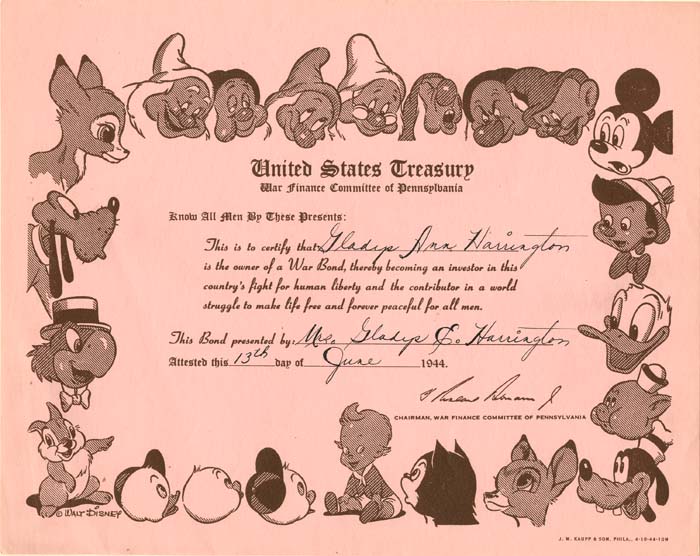United States Treasury War Bond - Very Rare Variety on Pink Paper
Inv# TB1099 Bond
WWII War Bond. Very Rare Variety on Pink Paper. War bonds, often called victory bonds in the context of propaganda, are debt instruments issued by governments to fund military operations and other wartime expenditures without imposing excessive taxes. They serve as a mechanism to mitigate inflation by withdrawing money from circulation in an economy stimulated by war. War bonds can be categorized into retail bonds, which are marketed directly to the public, and wholesale bonds, which are traded on stock exchanges. Appeals to purchase war bonds frequently invoke themes of patriotism and moral responsibility. Retail war bonds typically offer yields lower than those available in the broader market and are issued in various denominations to ensure accessibility for all citizens.
As the duration of the war became evident, the war bond and certificate initiatives were more systematically organized under the National War Finance Committee in December 1941. This committee was initially led by the president of the Bank of Montreal and later by the Governor of the Bank of Canada. Under this refined leadership, the committee devised strategies, propaganda, and extensive volunteer recruitment for bond drives. These drives occurred biannually, during which no other organizations were allowed to solicit public donations. The government allocated over $3 million for marketing efforts, which included posters, direct mail campaigns, movie trailers (some produced by Walt Disney in collaboration with the newly formed National Film Board of Canada's animation department), radio advertisements, and full-page ads in major daily newspapers and weekly magazines. Additionally, realistic staged military scenarios, such as the If Day event in Winnipeg, Manitoba, were utilized to raise public awareness and encourage bond purchases.
A bond is a document of title for a loan. Bonds are issued, not only by businesses, but also by national, state or city governments, or other public bodies, or sometimes by individuals. Bonds are a loan to the company or other body. They are normally repayable within a stated period of time. Bonds earn interest at a fixed rate, which must usually be paid by the undertaking regardless of its financial results. A bondholder is a creditor of the undertaking.










Ebay ID: labarre_galleries